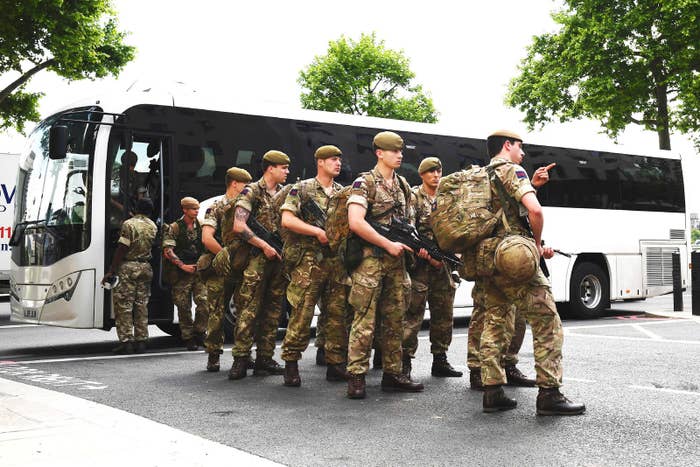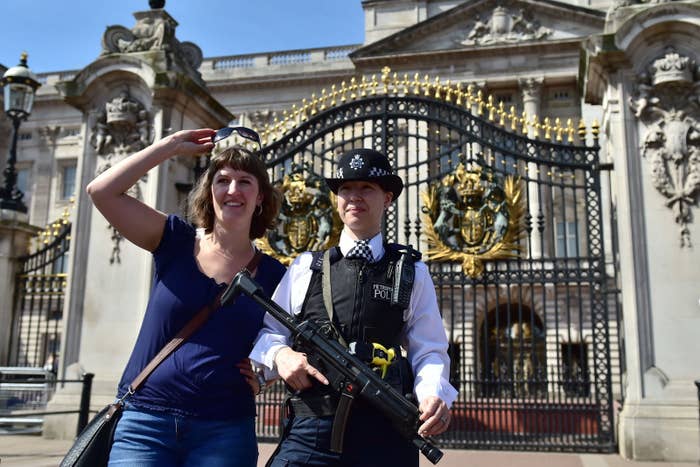
The decision to raise the UK's threat level to "critical" – meaning a terror attack is considered "imminent" – is already having an effect on policing, military deployments, and security precautions at high-risk targets.
London's Metropolitan police said the military would be deployed to protect locations including Downing Street, parliament embassies, and Buckingham Palace.
BuzzFeed News also understands police forces across the country are extending shifts, cancelling leave, and bringing in officers on their rest days.
Parliament has cancelled all visits and tours and is closed to all non-passholders, while the Scottish parliament is requiring extra security screening for all – requiring staff and other passholders to go through metal detectors they can usually skip. The changing of the guard at Buckingham Palace – a big draw for tourists – has been cancelled.
Speaking on BBC News on Wednesday morning, Amber Rudd, the home secretary, said the measure would be temporary but would not be drawn on whether this meant days or weeks.
“This is absolutely expected to be temporary,” she said.
Peter Fahy, the former chief constable of Greater Manchester police, told BuzzFeed News that critical alert status is an intensive one for officers. He said the threat level would be connected to concerns Abedi had accomplices – "Did this man make the bomb himself? Is there a bombmaker out there?" – as well as a wider risk from returning ISIS fighters following the stalling of the terror group's advance in Iraq and Syria.
"The crucial thing is, as the prime minister said, that we'll have soldiers on the streets – the problem otherwise is finding enough trained armed police officers," he said. "The UK has very high standards and expectations of armed officers, and so it's difficult to recruit them.
"As France has shown, even high numbers of paramilitary forces on the streets can't always prevent attacks. The key thing is public vigilance, and that people in communities who know anything that could help prevent attacks speak out."
The Met's Commander Jane Connors said the force was taking a number of steps, both visible and nonvisible, to boost security in the wake of the upgrade to the UK's threat level.
"The reality is that we must be prepared to be able to respond to and deal with armed and deadly attackers, so we must be in a position to respond with firearms officers who will use force to stop those attackers in their aim," she said in a statement.
"That is why is we have increased the number of firearms who are on duty, both out walking and in roaming patrols, at fixed points and carrying out a range of operations.
"We are using every tactical option – not just through the use of armed officers but ongoing work by the Counter Terrorism Command; working with partner agencies and gathering community intelligence.
"Whilst some of what we are doing will be obvious to the public there is a huge amount of work happening day and night that the public will never know about."

The troop deployments are part of a longstanding counterterror plan codenamed Operation Temperer, details of which first emerged in 2015 after being accidentally uploaded to a public website.
The plans – which have never before been used – allow for up to 5,000 troops to be deployed to protect critical infrastructure and high-value targets such as parliament and royal palaces, to free up resources for the police and intelligence agencies to continue their investigations.
On Wednesday afternoon Michael Fallon, the secretary of state for defence, explained that the purpose of having soldiers outside prominent buildings was to free up the armed police usually on duty for other tasks.
"It is to release armed police from these basic guarding duties that we've deployed these troops today," he said.
Theresa May announced the steps alongside the upgrade to the threat level in a statement on Tuesday evening. The change to the threat rating was made after an assessment by the Joint Terrorism Analysis Centre, a multi-agency unit based in MI5's Thames House headquarters.
May said the decision to raise the threat level was directly linked to police's ongoing investigation into whether Salman Abedi, named as the Manchester attacker, was working with others.
"[JTAC] has now concluded on the basis of today's investigations that the threat level should be increased, for the time being, from severe to critical," she said. "This means that their assessment is not only that an attack remains highly likely, but that a further attack may be imminent.
"The change in the threat level means that there will be additional resources and support available to the police as they work to keep us all safe. As a result of JTAC's decision, the police have asked for authorisation from the secretary of state for defence to deploy a number of armed military personnel in support of their armed officers."
Critical is the highest alert level of the UK's threat monitoring system, and this is only the third time the threat level has reached it since the system was introduced in 2006. On both previous occasions, in 2006 and 2007, it remained at "critical" for only a matter of days before being reduced once again.
Former chief constable Fahy told BuzzFeed News that for both operational reasons and reasons of principle, the critical status should only be brief.
"Obviously there are limits to this," he said. "Officers are on extended shifts, they're working rest days, they're working overtime. There are only so many officers available with firearms training, or specialist investigation skills. So this [the threat status] will be on constant review.
"I would like soldiers to be on the streets for as short a time as possible. What's crucial is that ISIS aren't allowed to win, and don't change our way of life, or of policing.
"The challenge here was this was a very targeted attack, against young people, youth culture, against women with the freedom to dress and do as they like.
"You're not going to stop Manchester partying, and you're not going to stop women in Manchester going out wearing whatever they want. You're not going to change Manchester."
